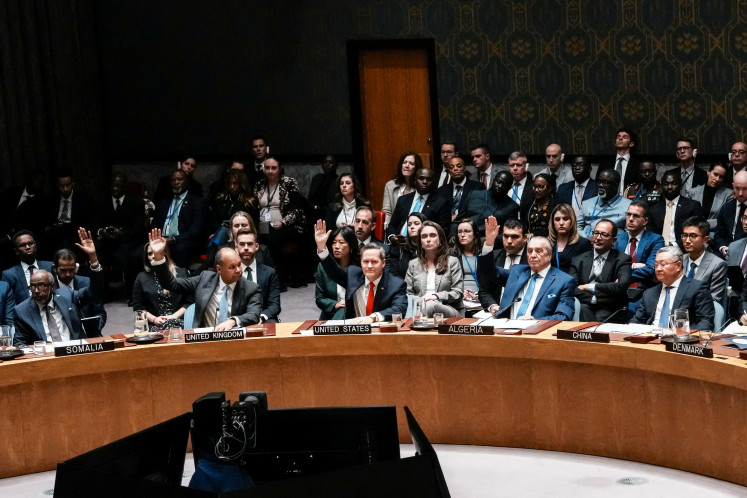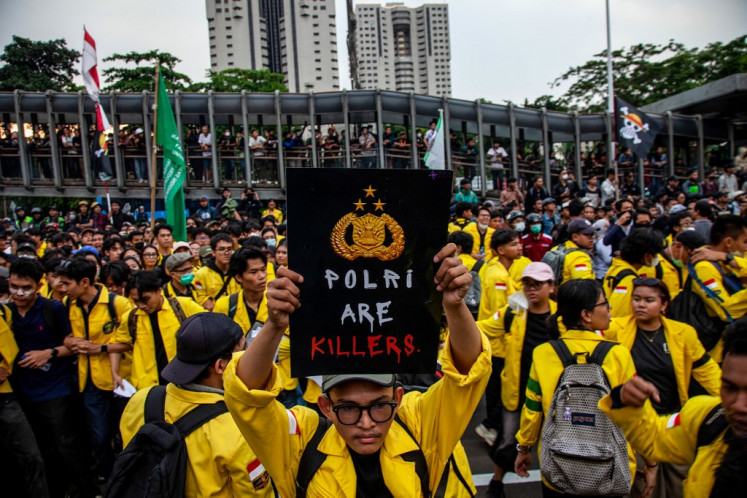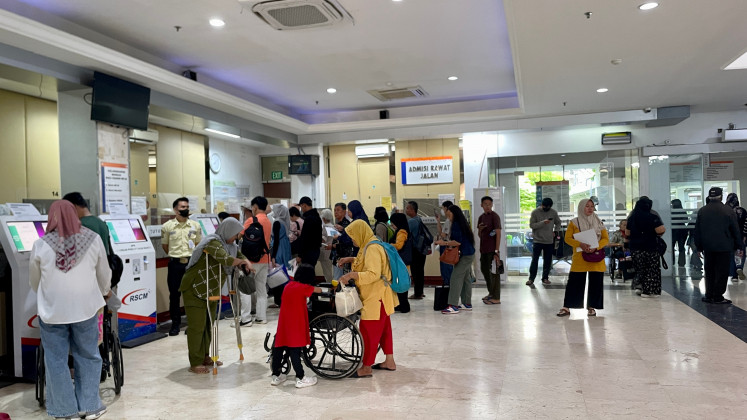Popular Reads
Top Results
Can't find what you're looking for?
View all search resultsPopular Reads
Top Results
Can't find what you're looking for?
View all search resultsLAWRENCE BLAIR: Witness to Change
British-born Bali resident Lawrence Blair has witnessed and documented three decades of Indonesia's history and evolution
Change text size
Gift Premium Articles
to Anyone
British-born Bali resident Lawrence Blair has witnessed and documented three decades of Indonesia's history and evolution.
He revels in the archipelago's diversity, looking forward to a future more graceful than its present and less innocent than its past.
"When we first came here *in the early 1970s*, Indonesia was like a child - a beautiful, uncorrupted, innocent child," says Blair, author of Ring of Fire, the recently republished epic saga of his travels throughout the archipelago with his late brother Lorne, a documentary photographer and videographer.
"Now, it's like a spotty, hormone-ridden teenager. Things will get better when it grows up, but not for a while."
Sitting at Legian Beach with his talkative pet lorikeet Dicky (for "ridiculous") who hails originally from Papua, Blair seems to cope with life's - and Indonesia's - eccentricities by maintaining a healthy sense of humor. Ring of Fire, originally released as both a book and documentary film series by the BBC in the UK and PBS in the USA in 1988, chronicled a decade of the brothers' adventures among flora, fauna and cultures previously little-known to the modern world.
From a well-off British family and with an interest in knowing more about the world, Blair first arrived in Jakarta in 1965 as a delegate to a Subud conference on mysticism while studying psycho-anthropology in the UK. Violence raged in the streets outside the conference as the Sukarno era drew to a tumultuous close.
"There was gunfire going on outside the compound," says Blair.
He was told not to leave the compound in the interest of his own safety but "being very disobedient" rushed out in a becak (pedicab) and took photographs of demonstrations in the streets that were published on the front page of The Straits Times.
"It was a pretty foolish thing to do," admits the more mature Blair. "They had bombed the British Embassy. *Out with the Yanks' was written on big posters all over the city."
The Blair brothers returned to Indonesia in the early 1970s loaded with film and a modest budget courtesy of Ringo Starr. The rock star and the writer had become acquainted through common social circles in London. Starr liked the idea for the first two trips - to film the elaborate royal funeral of Toraja's "star children" and a Bugis sea excursion in search of the greater bird of paradise.
What did they hope to achieve in Indonesia?
"Satisfying one's lust for adventure in the unknown," he says with a grin. He said that he didn't leave satisfied but rather "confirmed that it was a worthwhile lust".
As an anthropologist, he was also interested in gathering data on tribal peoples.
"Ideally the least visited ones, those not even visited by their own governments or by foreign missionary groups, to keep a record of their ways and beliefs and abilities before they were lost and vanished forever."
"Now, I'm living in a world where the dominant power is tourism and money, which is completely the opposite of what I'm interested in because it is the conqueror and the dissolver of the mystical past. *Tourism* is the great homogenizer and leveler."
There is inevitably a tension between the desire to bring attention to these amazing, beautiful, sacred places and the desire to see them preserved unadulterated. But are there still places just as wild as 30 years ago?
"Absolutely. But if I tell you what they are, everybody will be there in 10 seconds!"
The roughly 600 islands comprising Raja Ampat in West Papua is "the flavor of the month".
"Indonesia should be happy if they had that and nothing else," enthused Blair. "It is wonderful primary jungle, very few people living there, birds of paradise dancing in the trees above you, so many species of fish that if one goes there with the proper ichthyologist, they'll find a new species. And that's just one little tiny archipelago."
Blair hopes that the current re-release of Ring of Fire on both paper and DVD will draw in a new generation of readers and viewers who will take away "a sense of wonder and awe and a sense of the tremendous variety of human nature".
"We don't all think and see the world in the same way," Blair says of how Asians, particularly in tribal societies, view the unseen world as equally real, whereas people in the West often only really believe in what they can touch and see and measure. Environmental and cultural pressures are bearing down upon such societies.
"I have a feeling we might have been quite lucky over the last 150 or 200 years because we have lived - all of us, even the whole of civilization - in a very narrow wave band of sustainability in an otherwise very wild surface of the planet.
"We may be weaving our way into another big physical, environmental, geophysical disruption ."
But, as he says, "it depends on how big a view you take of it".
"In the short term, I don't think it's going to get better. In the long term," says Blair with a casual lilt in his voice, "everything's working out just fine."
Blair remains "cautiously optimistic" that the attention brought by films like Eat Pray Love and the focus of celebrities like Richard Branson and James Cameron have the potential for a positive influence. "The next couple of years are going to be very interesting transformational years in the evolution of Bali."
Asked if there are other parts of the world that capture his imagination like Indonesia, he says, "Everywhere is beautiful. It's like marriage, isn't it? You've got to settle on one and go into depth.
"And then you can see the mystery of everything else there as well."
Read more about Indonesian identities in the August WEEKENDER, available July 23










